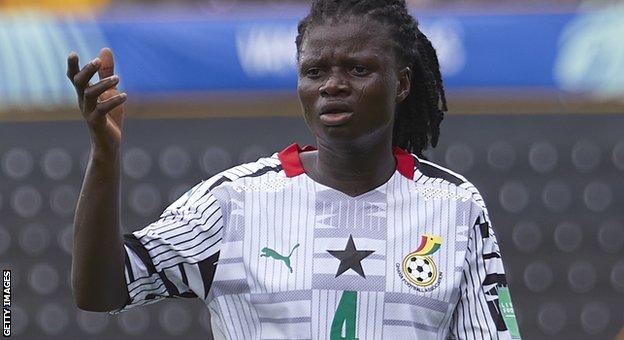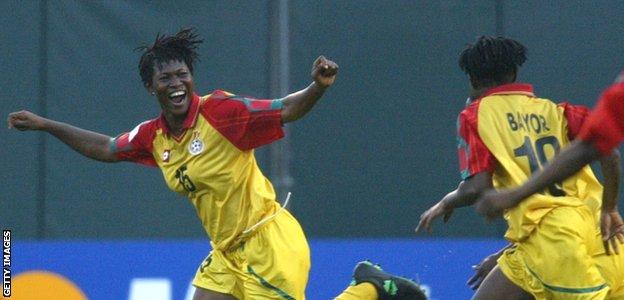Ghana were pioneers when it came to women's football in Africa, with the Black Queens' early years making it look like the side would always be continental heavyweights.
After playing their first international in 1991, a valiant and skilful squad was graced with players like Alberta Sackey, Genevieve Clottey and Adjoa Bayor and enjoyed success in its first decade.
Runners-up in three of the first five editions of the Women's Africa Cup of Nations (Wafcon), the Black Queens also featured at three successive World Cups.
"When we started women's football here in Ghana, many countries hadn't yet started," Habiba Atta, who founded the country's first women's club and spearheaded the birth of the national side, told BBC Sport Africa.
"It was after we began that others caught on."
Although Ghana did not win major silverware, supporters found solace in the team's style of play.
However, the Ghana Football Association (GFA) failed to capitalise on the momentum or build a strong structure for the team, meaning performances on the continental stage began to dip from 2008 onwards.
A third-placed finish at Wafcon in 2016 was the highlight amidst four group-stage exits out of five - one of which came about on home soil in 2018.
In recent years, the likes of Morocco, current Wafcon holders South Africa and Zambia have all invested hugely in women's football, so leaving the Queens to hark back to former glories for comfort.
After being eliminated by arch-rivals Nigeria in qualifying, Ghana were absent from this year's Wafcon - which also determines Women's World Cup qualification - in Morocco and so will miss next year's finals in Australia and New Zealand.
The question is: where did Ghana go wrong in building on the foundations that Atta imposed?
- Coaching changes and scandals

Ghana suffered a group-stage exit at the Under-20 World Cup in August
"The problem is that the authorities don't believe in continuity," Isaac Paha, Black Queens coach from 2004 to 2008, told BBC Sport Africa.
"Once you reach a certain level, they bring in another person to take over. As a coach, when you take a team and start preparing younger players to join, you realise you have a better opportunity to take them forward than a new coach."
In the final year of Paha's stint in charge, the GFA appointed Graham Potter - who is now manager of Premier League club Chelsea - as technical director of the Black Queens.
"He was made to believe he was coming to take over and challenged my style of coaching," Paha claimed.
Despite the addition of Potter, Ghana suffered heavy defeats against Australia, Canada and Norway at the 2007 World Cup, and Paha was dismissed six months after the tournament in China.
Ghana have not appeared at a World Cup finals since.
- Friendly rows
Paha says the GFA made few provisions for incoming national coaches, failing to provide reports of coaching styles, structures or philosophies of predecessors, but the GFA responded by saying coaches are required to make reports on each tournament they go to before then making recommendations.
After two years as assistant coach, during which time Ghana failed to qualify for the 2012 Wafcon, Yusif Basigi became head coach of the Black Queens in 2013.
Having led the squad to the All-Africa Games title in 2015 and then third place at the 2016 Wafcon, he was surprisingly dismissed the following March.
"At times, we'd be in training camp for long periods, but we were not given the needed platform of international friendlies," Basigi said.
A GFA spokesman pointed out the Black Queens played in the Turkish Women's Cup in 2020 and the Aisha Buhari Cup in September 2021, prior to facing Morocco ahead of this year's Wafcon.
"We have done our best in the last two years with at least four different high-profile friendly matches," the spokesman said. "Unfortunately that wasn't enough to take the team to Wafcon."
Major scandals - namely the bonus row at the men's World Cup in 2014 and Anas Aremeyaw Anas' Number 12 expose in 2018 - have also upended the Queens' path.
In the first instance, Ghana's government sent over $3m in cash to Brazil to save face after the Black Stars threatened to boycott their last group match, while four years later corruption among GFA officials was exposed.
The scandals had a domino effect on every aspect of football in the country - grassroots, development and leagues - while pay equality for women's sides has also been a long-running topic of discussion.
Bonuses for the Queens' 2015 and 2016 achievements remained unsettled for several years, with unfulfilled promises mangling any ounce of passion players had for the national badge.
In 2020, the squad had to stage a protest at Ghana's Sports Ministry, with threats to sleep at the premises and boycott national matches if they were not paid an outstanding debt of $12,000.
After the team's series of protests, the money was eventually paid.
- An uncertain future
The Black Queens will not see growth without a hierarchy of youth football structures put in place, but Habiba Atta thinks the GFA are making progress.
"This current GFA [administration] is doing amazing for women's football compared to the previous ones," she told BBC Africa Sport.
However, disappointment and humiliation still abounds.
In July, the Confederation of African Football (Caf) found Ghana guilty of age-cheating at Under-17 level, banning the Black Maidens from the next two editions of the U17 Women's World Cup and handing the GFA a $100,000 fine.
At this year's U20 World Cup in Costa Rica, Ghana failed to reach the knock-out stages for the sixth consecutive time.
The Black Princesses squad were without captain Evelyn Badu, who suffered an injury in training, but the forward said their preparations were far from ideal.
"My absence did affect the tactical prowess of my teammates," Badu told BBC Sport Africa.
"I don't want to compare the women's game to the Black Stars but we all know how we are treated. Women's football needs to be polished, tactically and technically.
"We were in camp for four months preparing for qualifiers but we couldn't play even one international friendly match. We were playing against local teams like Faith Ladies, Army Ladies, and sometimes with boys' academy sides."

Alberta Sackey featured in Ghana's first two Women's World Cup appearances, in 1999 and 2003, but the Black Queens have not qualified for the finals since 2007
After what Badu describes as an "uphill battle" to beat Zambia in their first qualifier, they lost 4-1 against France in their sole senior-friendly before heading to Costa Rica.
"I believe a series of international friendlies should be organised for our national teams before we play major competitions, otherwise our players will be rusty," Badu added.
Badu starred as Hasaacas Ladies reached the final of the inaugural Women's African Champions League last year, but the club were unable to qualify for the second edition in Morocco last month, with Ampem Darkoa Ladies also missing out.
On the brighter side, the Ghana Women's Premier League is taking shape, with new broadcast and sponsorship deals.
A plethora of reasons can account for the crumbling of an international legacy, with the GFA and the Ghanaian government appearing to have failed women's football.
A GFA spokesman said it is committed to dedicating more attention to the grassroots game, while a technical directorate has been formed to suggest solutions to the challenges facing the various national sides.
The future hangs by a fine thread, with the wait ongoing for the GFA to truly commit time and resources to revive the Black Queens' once-venerated status.
Source: BBC


Comments